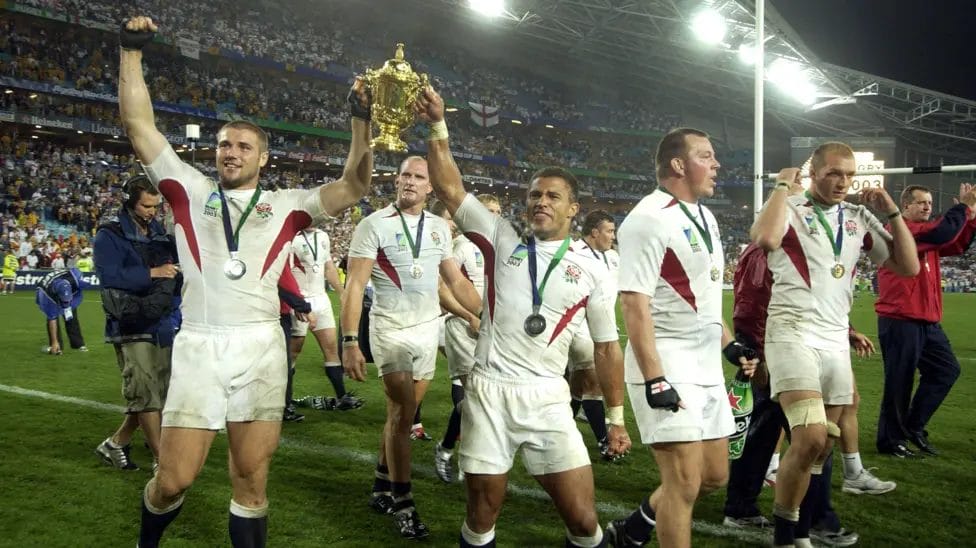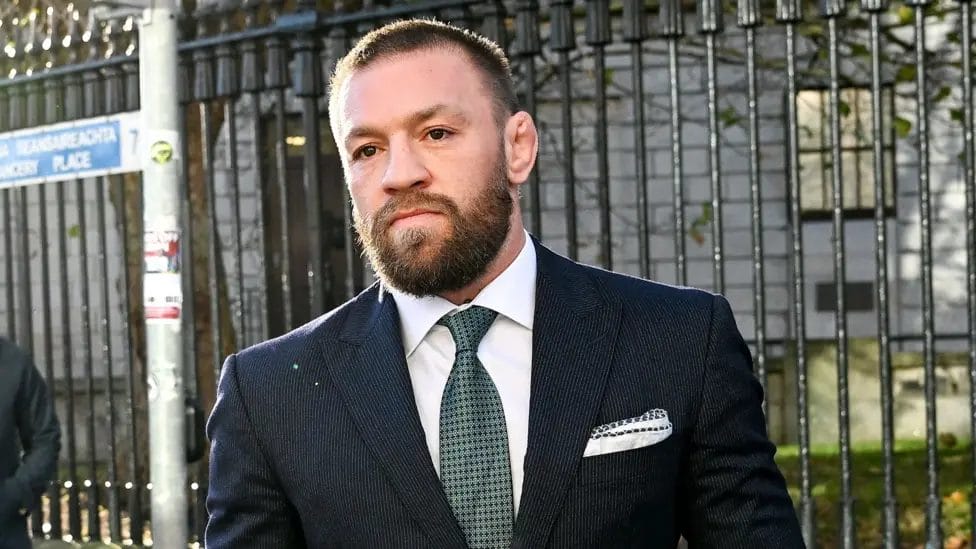
Former England Wing Ben Cohen Reflects on Life After the 2003 Rugby World Cup
Ben Cohen, former England wing and member of the 2003 Rugby World Cup-winning team, has opened up about his struggles in life after retiring from elite sport. Despite being part of one of the most celebrated moments in English rugby history, Cohen admits that he “chooses to forget” his role in the 2003 Rugby World Cup victory as a way of coping with the challenges that have followed. Since retiring, Cohen has faced a series of personal battles, including financial difficulties, mental health issues, and hearing loss, and he has found it increasingly difficult to relive the triumph that defined his career.
In a candid interview with BBC Radio 4’s Today programme, Cohen shared his feelings about his past achievements and how they have impacted his life. “You relive that moment, week in, week out, and trying to move on from it can be a little bit difficult sometimes,” Cohen explained. For him, the constant reminders of the 2003 Rugby World Cup success have become overwhelming, and it is easier for him to distance himself from that victory in order to move forward. “You choose to forget what you have achieved – if I can get away from that, I don’t have to live it so much because it brings a little bit of pain,” he added.
The Weight of the 2003 Rugby World Cup Glory
The 2003 Rugby World Cup remains one of the greatest achievements in the history of English rugby, and Cohen’s involvement in that victory has often defined his career. As part of the squad that triumphed under coach Sir Clive Woodward, Cohen was integral to the team’s success, which culminated in a dramatic 20-17 win over Australia in the final. However, for Cohen, the glory of that win now feels like a distant memory, overshadowed by the personal challenges he has faced in the years since retiring from rugby.
The pressure to constantly reflect on such a monumental achievement can be overwhelming, especially when trying to adjust to life after elite sport. Cohen admitted that he sometimes feels trapped in the past, as the moment of winning the 2003 Rugby World Cup is revisited repeatedly in public discussions about his career. “It’s hard to move on from something when you’re always reminded of it,” he explained. For Cohen, focusing on the present and future rather than reliving past glories has been crucial to his mental well-being.
Mental Health Struggles and the Aftermath of Elite Sport
Cohen’s post-rugby life has not been without its struggles. In addition to dealing with financial challenges and hearing loss, Cohen has faced ongoing mental health issues that are common among former athletes. Many players who have retired from professional sports find it difficult to adapt to life after the game, and Cohen’s experience has been no different. The lack of support for players transitioning out of elite sport has become an important issue, and Cohen, along with other members of the 2003 team, is now working to raise awareness about these struggles.
In recent months, Cohen has joined forces with other former players, including ex-prop Phil Vickery, to launch an initiative aimed at helping former rugby players who are grappling with mental and physical health problems. This initiative has been supported by a new documentary titled Unbreakable, which delves into the struggles faced by former players, many of whom have suffered brain injuries due to the nature of the game. The documentary highlights the lack of care and precaution taken by rugby authorities in the past and its long-term impact on the players’ health.
Cohen and Vickery Advocate for Support and Understanding
Phil Vickery, another member of the 2003 Rugby World Cup-winning squad, shared similar sentiments about the challenges former players face. Vickery, along with others, has spoken out about the lack of proper care and precaution for players during their careers, which has led to a higher incidence of brain injuries and other long-term health problems. He emphasized the importance of recognizing athletes as human beings with struggles and vulnerabilities, rather than as invincible heroes.
“We, with lots of other people, created a magical moment. We toured around London with a million people watching. It was the most amazing experience, but we are human,” Vickery stated. “We have struggles, we have highs and lows and the documentary is showing people that it is all right not to be all right.” This message is crucial, as it encourages athletes to be open about their mental health and reminds the public that former sports stars face real-life challenges after their careers end.
Vickery also pointed out the need for a shift in how society views athletes, stressing that the myth of invulnerability can be harmful. “It is about just being honest, instead of talking in a false, mystical way about how everything is amazing and brilliant. That’s not negative – it’s just reality,” he explained. The message from both Cohen and Vickery is clear: life after elite sport is not always easy, and it’s okay to admit that things are not always perfect.
Cohen’s Legacy and the Future of Former Rugby Players
Although Ben Cohen has chosen to “forget” the 2003 Rugby World Cup victory as a means of coping with his personal struggles, the legacy of that triumph remains a significant part of his life. The 2003 Rugby World Cup will always be a defining moment in English rugby, and Cohen’s contribution to that victory cannot be overlooked. However, his focus is now on raising awareness about the difficulties that former players face, both mentally and physically.
Through his involvement in the Unbreakable documentary and initiatives to support former players, Cohen is helping to pave the way for better mental health support for athletes transitioning out of professional sport. While the 2003 Rugby World Cup victory will always be a part of his story, Cohen’s ability to speak openly about his struggles and advocate for change is what will ultimately define his legacy beyond the rugby field.










Oh wow, Ben Cohen forgot about winning the 2003 Rugby World Cup? Shocking! I mean, who wouldn’t want to forget being a part of such a monumental moment in sports history? It’s not like it was a life-changing event or anything. Instead, let’s just focus on the struggles of hearing loss and financial difficulties because clearly, that’s what everyone dreams about post-retirement. Bravo, Ben! What an inspiring way to cope with life!
So Ben Cohen chooses to forget his glorious past? Genius move! Why bother cherishing memories of millions celebrating your victory when you can wallow in the mundane struggles of everyday life? I mean, who needs the satisfaction of being a champion when you can discuss mental health issues instead? Way to prioritize, Ben! Forget about your legacy; it’s so much better to stress over hearing loss. Clearly that’s what all sports heroes dream about after retirement.
Right?! I just love how he thinks ignoring his success will somehow make his life easier. Brilliant strategy! Let’s all just pretend we never did anything remarkable and focus on our flaws instead. Because that’s what motivates people – wallowing in self-pity while forgetting their achievements! Good luck with that plan, buddy!
I can’t even! The man was on top of the world and now he wants to act like he’s just another Joe off the street dealing with life’s ‘challenges’. Come on now, where’s the fun in that? Forgetting your glory days sounds like a great way to enjoy retirement – said no one ever! What’s next? Ignoring birthdays too?
‘Choose to forget’? Wow, talk about an innovative approach to dealing with fame and success! Who knew that simply pretending something never happened could solve all your problems? Forget therapy; let’s just ignore everything good that ever happened in our lives instead. That’ll definitely help us cope better with reality!
‘The Weight of Glory’? More like the weight of denial if you ask me! Cohen really thinks he can just brush aside an entire career as if it were yesterday’s news. Good luck convincing anyone that pushing away success is going to lead to happiness. Spoiler alert: It won’t! But hey, at least he’s keeping it real by focusing on negativity!
‘It’s hard to move on’ – well duh! Maybe if he embraced his past instead of running from it, he wouldn’t feel so trapped. But I guess facing reality is overrated when you can play pretend and live in a fantasy world where nothing ever mattered.